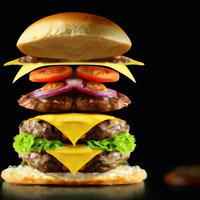
1 serving (150 grams) contains 300 calories, 15.0 grams of protein, 12.0 grams of fat, and 30.0 grams of carbohydrates.

Log this food in SnapCalorie

Nutrition Information
Calories |
476.2 | ||
|---|---|---|---|
% Daily Value* |
|||
| Total Fat | 19.0 g | 24% | |
| Saturated Fat | 7.9 g | 39% | |
| Polyunsaturated Fat | 0 g | ||
| Cholesterol | 63.5 mg | 21% | |
| Sodium | 1111.1 mg | 48% | |
| Total Carbohydrates | 47.6 g | 17% | |
| Dietary Fiber | 3.2 g | 11% | |
| Sugars | 9.5 g | ||
| protein | 23.8 g | 47% | |
| Vitamin D | 31.7 mcg | 158% | |
| Calcium | 238.1 mg | 18% | |
| Iron | 4.0 mg | 22% | |
| Potassium | 396.8 mg | 8% | |
* Percent Daily Values are based on a 2,000 calorie diet. Your daily values may be higher or lower depending on your calorie needs.
Food Attributes
Source of Calories
About Fast-food cheeseburger
A fast-food cheeseburger is a classic offering within American cuisine, celebrated for its quick and convenient preparation. Typically composed of a seasoned beef patty, melted cheese, lettuce, tomato, pickles, and condiments like ketchup or mustard, all sandwiched between a toasted bun, it delivers a satisfying mix of flavors. While the beef patty and cheese provide protein and calcium, the calorie count can be high due to the fat content and processed ingredients. The bun and condiments may add added sugars and refined carbohydrates. Vegetables like lettuce, tomato, and pickles contribute small amounts of fiber and vitamins, but their quantity is minimal. While providing energy and a comforting dining experience, its high sodium, saturated fat, and calorie levels are considerations for a balanced diet. Consuming this item in moderation, alongside healthier options, is key to maintaining nutritional balance.



